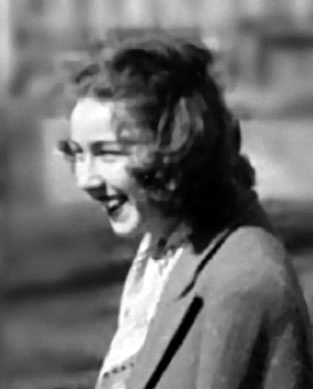85 Flannery O’Connor (1925 – 1964)
Amy Berke; Robert Bleil; Jordan Cofer; and Doug Davis

Photographer C. Cameron Macauley
Wikimedia Commons
CC BY-SA 3.0
Mary Flannery O’Connor was born in Savannah, Georgia and lived there until 1938. An Orthodox Catholic family, the O’Connor family lived in Lafayette Square, a largely Catholic neighborhood of Savannah, mainly through the generosity of her second cousin, Kate Semmes (whom O’Connor would call “Cousin Katie”). In 1936, O’Connor’s father, Edwin, was diagnosed with lupus and was hospitalized in Atlanta; his diagnosis would later force the family to leave Savannah. While Edwin sought treatment, both Regina and Flannery would often stay with family in Milledgeville.
In 1941, Edwin’s death would imprint itself on O’Connor, who was close with her father. Both Flannery and her mother, Regina, subsequently moved to live at Andalusia, the maternal family farm in Milledgeville. After high school, O’Connor enrolled in Georgia College for Women (now Georgia College) in Milledgeville, where she completed a degree in English and Sociology. In college, O’Connor was active with both the literary magazine, The Corinthian, and the yearbook, The Spectrum. After college, O’Connor enrolled in journalism school at the University of Iowa but, once there, enrolled in the Iowa Writer’s Workshop, where she was able to work with many of the most influential writers of her time.
At the Writer’s Workshop, O’Connor established herself as one of their most promising writers, winning a book contract, as well as a prestigious Yaddo fellowship at the Yaddo Writers Colony in New York. However, after being diagnosed with lupus in 1951, Flannery O’Connor returned to Andalusia, where she remained. At the age of twenty-five, she published her first novel, Wise Blood (1952) and followed it up with her first collection of short stories, A Good Man is Hard to Find and Other Stories (1955). Her second published novel, The Violent Bear It Away (1960), was nominated for a National Book Award. Up until her death from lupus, at the young age of thirty-nine, she was working on her second collection of stories, Everything That Rises Must Converge (1965). In 1971, O’Connor’s friend and literary executor, Sally Fitzgerald, helped publish The Complete Stories of Flannery O’Connor which won the National Book Award and was later awarded the Reader’s Choice Best of the National Book Award (2010).
O’Connor’s fiction is famous for its Southern gothic settings and her use of dark humor. Other themes in her fiction include the following: her relationship with her mother, life at Andalusia, and her Orthodox Catholicism. “A Good Man is Hard to Find” is O’Connor’s most anthologized story and one of her most violent. The story follows a family of six that, while on vacation to Florida, encounter the Misfit, a pensive, yet troubled serial killer, and one of O’Connor’s most famous characters. The Misfit states that his troubles center on Christ’s claims of resurrecting the dead. In “Good Country People,” Joy-Hulga, a philosophy Ph.D. with a wooden leg, tries to seduce Manly Pointer, a naïve traveling bible salesman.
“A Good Man Is Hard to Find”

Or try the link below to access this selection:
https://web.archive.org/web/20230831171745/https://xroads.virginia.edu/~DRBR/goodman.html
“Good Country People”

http://faculty.weber.edu/Jyoung/Engl…y%20People.pdf
Starting in 1936, the ever-changing National Book Awards have been awarded annually by various organizations within the publishing industry and, since 1988, by the non-profit National Book Foundation to honor books written exclusively by American authors that have sold well or otherwise merit critical acclaim.
Southern gothic is a genre of writing that is prevalent in the literary tradition of the American South. Borrowing features from gothic literature of the Romantic period, works may focus on dark themes associated with the supernatural, or they may focus on exaggerated characters that are eccentric, freakish, disfigured, or flawed in some disturbing way. Often, works incorporate elements of the grotesque. Southern writers sometimes used these conventions to critique the underlying Southern social order, illuminating disturbing foundations on which the social order was constructed.

